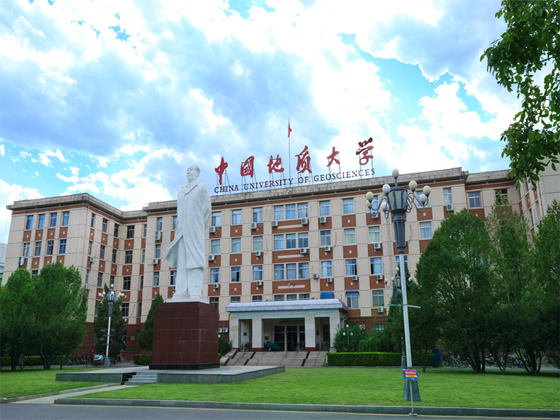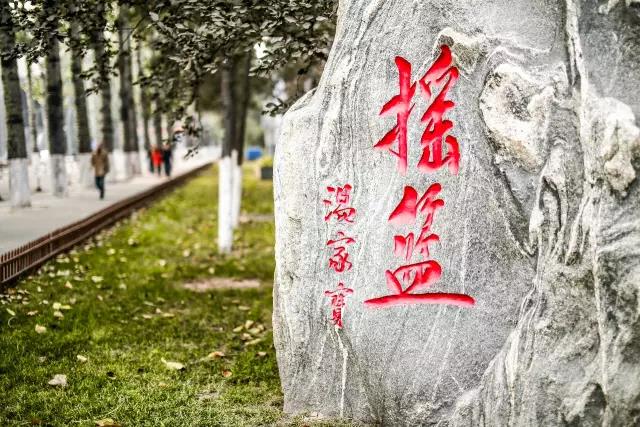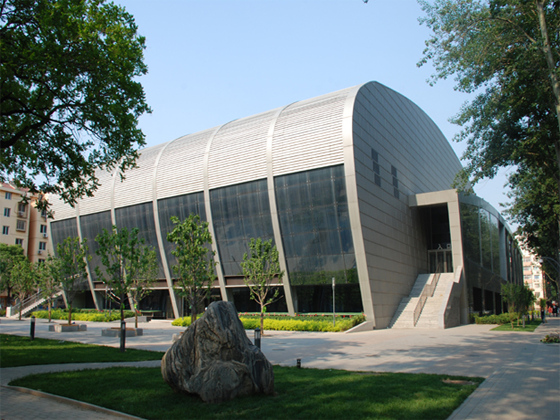Ⅰ General Information
China University of Geosciences (Beijing), a well-known institution of higher learning both in China and abroad, is located in Xueyuan Road, Haidian District, Beijing, surrounded with prestige universities. The university is a national key university affiliated of the Chinese Ministry of Education and established jointly with the Ministry of Natural Resources. In 2017, the university was listed as one of the “Double First Class” universities..
Founded in 1952 as a result of the merger of the geology departments (subjects) from Peking University, Tsinghua University, Tianjin University, and Tangshan Railway College, China University of Geosciences (Beijing) is a university with a long history and profound heritage. In 1960, it was awarded the name "Beijing Cultural and Educational Front Red Flag College". Early success led to its gaining a foothold among the 64 “national key colleges and universities”. In 1970, the university was obliged to move to a new campus in Wuhan. Thanks to the direct support of Comrade Deng Xiaoping, the university resumed at the original site in Beijing in 1978. In 1987, the Ministry of Education approved a plan for China University of Geosciences to establish two institutions of higher learning, in Beijing and Wuhan respectively. It was among the first universities designated for the state key construction of the “211 project”, “985” innovation platform for advantageous disciplines, and was among the first 33 universities in China approved to set up graduate schools. In February 2000, China University of Geosciences (Beijing) (hereinafter referred to as “CUGB”), previously managed by the Ministry of Land and Resources, was put under the management of the Ministry of Education. In March 2005, the university headquarters was abolished, CUGB and China University of Geosciences (Wuhan) became independent educational entities.
Since its foundation, CUGB has experienced an unusual course of development with the construction of New China, and has grown with the thriving of the country. CUGB has borne in mind its fine tradition of serving the country with its expertise in geology, undertaking the glorious mission of blazing a trail of socialist construction, producing a large cohort of graduates equipped with the technical knowledge and professional attitudes needed to build up the nation and contribute to the flourishing of the earth sciences. Facing the challenges of running a university, CUGB and its staff have developed perseverance, tenacity and courage, with the pursuit of “patriotism, endurance, pioneering spirit and continuous exploration”. The work of study in China at CUGB has always been guided by serving the needs of the country’s strategy, and implement the party and the country’s diplomatic strategy, resources and environment strategy and the “going out” strategy for Chinese enterprises. Cultivate a group of high-quality talents who have known and friendly to China with qualified professions. Strengthen the Study in China brand, create key and high-quality projects for studying in China, and take multiple measures to promote the connotative development of studying in China.
CUGB now has 16 schools, 44 undergraduate programs, 16 doctoral degree conferring spots of first-level disciplines, 34 master’s degree conferring spots of first-level disciplines, and 14 master’s degree conferring spots in professional fields. There are 16,719 full-time students, including 8,431 undergraduates, 6,426 postgraduates, 1,691 doctoral candidates, and 171 overseas students including students from Hong Kong, Macao and Taiwan as well as overseas Chinese. The university campus covers a total area of 5,258,443 square meters and in addition, there are practical geological field stations in Zhoukoudian, Beidaihe, and Pingquan, Hebei.
CUGB is a research-oriented university featuring Geology, Resources, Environment, and Geotechnical Engineering, covering science, engineering, literature, management, economics, law and other disciplines. Among them 2 were listed as the national construction of "Double First Class" discipline, and 2 obtained A+ in the fourth round of discipline evaluation. 6 disciplines have ranked world’s top 1% of the ESI, and Earth Sciences have entered the top 1‰.
CUGB boasts 15 post-doctoral research centers and well-cultivated faculty. Among the 1,461 staff members and 976 full-time teachers, 276 are professors, 357 associate professors, and 365 doctoral supervisors. There are 12 academicians of the Chinese Academy of Sciences, and 2 academician of the Chinese Academy of Engineering, 8 teachers of the National Teaching Project, 13 winners of the National Science Fund for Distinguished Young Scholars, 4 National-level Special-term professor, 1 National-level Famous Teacher Award winner, 2 National-level Outstanding Teachers, 1 National Famous Professor, 14 winners of the National Science Fund for Outstanding Young Scholars, 4 Nation-level Young Scholar, 26 are titled Distinguished Teacher in Beijing, and 5 are titled Distinguished Young Teacher in Beijing, and 15 Post-doctoral Research Centers are established.
CUGB enjoys an outstanding reputation for talent cultivation. The university has always regarded cultivating people with good virtue as its fundamental mission. By far, more than 200,000 outstanding students have graduated for the university, including a large number of elites in their industries and Comrade Wen Jiabao was one of the representatives. 40 of its graduates have been elected academicians of the Chinese Academy of Sciences and the Chinese Academy of Engineering, and more than 200 of them have become model workers at or above the provincial and ministerial level. The university adheres to the training goal of high-quality and innovative talents with “good virtue, solid foundation, extensive knowledge and profound specialty”, always center on talent training and recognize the fundamental importance of undergraduate education, and forms an education system integrating "general education, professional education and innovation and entrepreneurship education". The university has 20 first-class undergraduate majors, 6 national quality courses, 2 national experimental teaching demonstration centers and 1 national virtual simulation experimental teaching center. Students have performed well in various discipline competitions, volunteer services, social practice, innovation and entrepreneurship, and artistic and sports competitions.
CUGB is an important base for national geoscience research. The University has strengthened its scientific layout and organization, and has made remarkable achievements in research projects, high-level research, scientific research awards, training of research talents, construction of research platforms, intellectual property rights and transformation of research achievements. CUGB has yielded fruitful results in the research on geological evolution of the Qinghai-Tibet Plateau, non-traditional isotope geochemistry, geological processes and mineralization, ultra-deep drilling as well as in polar research, and has published many papers in the international top journals such as Nature, Science and Nature Geoscience. In the past 5 years, the university has won 24 national and provincial science and technology awards as the first signature unit to complete the project. The university has a total of 19 key laboratories, ranging from the National Key Laboratory of Geological Processes and Mineral Resources, the National Platform for Sharing Rock and Mineral Fossil Specimens, those of the Ministry of Education and the Ministry of Natural Resources, engineering centers and provincial-level scientific research platforms. The university will promote the construction of “five major aspects”, namely “major discipline construction”, “major science initiative”, “major science equipment”, “major science and technology project” and “major resource platform”, and promote the transformation and upgrading of traditional geoscience to earth system science.
CUGB is active in international exchanges and cooperation. CUGB has signed cooperation agreements with a number of world-class universities and high level research institutions including University of California, Los Angeles, Colorado mining institute, University of Waterloo, University of Edinburgh, University of Birmingham, University of Hanover, Postdam Geoscience Research Center, University of Sydney, Macquarie University and others. Besides, CUGB has established cooperative partnership with more than 200 colleges, universities and research institutions across over 60 countries and regions. The university secured 5 Bases for Introducing Talents and Discipline to Universities, conducting multiple national-level talent-introduction projects. Based on the “20+20 Cooperation Plan for Chinese and African Universities”, the University has set up a Confucius Institute in the University of Namibia..
In the new era, CUGB will march on a new journey. Guided by Jinping Xi Thought on Socialism with Chinese Characteristics, the university adheres to the motto of “hard work and plain living, staying realistic and pragmatic”, follows the strategic concept of the “three stages” at the time of CUGB’s one hundredth anniversary, insists on cultivating people with good virtue, conducts the “implementation action”, unswervingly blazes the connotative development path. Facing the country’s major strategic needs, serving the “one Belt and one Road”, the national top-level cooperation initiative, and promoting international collaborative innovation; centering on the “Double First-Class” construction, the transformation and upgrading requirements of Earth system science, actively participate in major international scientific research collaboration and education cooperation, promote international cooperation and exchange key constructional projects as a whole. Hence, we wholeheartedly seek development, and constantly create a new situation of the construction of world-class university in the field of earth science, in order to realize the Chinese dream of "two one hundred" goals and the great rejuvenation of the Chinese nation!
Ⅱ Admission Instructions
Plan of Admission
CUGB accepts international students at the following levels: doctoral students, master's students, undergraduate students, Chinese language students, advanced students and general students. We can accept Chinese government scholarship and Beijing Municipal Scholarship for international students.
Time for Application
1.Self-funded student:From October 15, 2021 to June 30, 2022
2.Beijing Government Scholarship:From January 1, 2022 to April 15, 2022
Conditions for Applying
(1) Foreign citizens who are physically and mentally healthy, law-abiding and holding valid passports.
(2) Undergraduate applicants are under the age of 30, master's applicants under the age of 35, and doctoral applicants under the age of 40.
(3) Applicants should have a degree equivalent to a Chinese degree.
(4) To apply for Chinese-taught majors in CUGB, you need a Chinese proficiency certificate of HSK-4 (inclusive) or above. To apply for English-taught majors in CUGB, you need the corresponding language skills.
Documents for Applying (Bachelor, Master or PhD)
(1) Application form (Can be downloaded from http://bm.cugb.edu.cn/gjhzc/ ).
(2) Academic diploma: a photocopy of the applicant’s latest academic diploma or certificate of university education.
(3) Academic record: The original transcript of academic record (A photocopy of the transcript will not do).
(4) Study plan in China.
(5) Two reference letters for Master or PhD degree.
(6) A photocopy of the applicant’s passport.
(7) Original Heath Exam Form.
(8) A photocopy of HSK-4 certificate.
(9) Certificate of No Criminal Record.
(10) A photocopy of the applicant’s emergency contact (can be a passport, license, or other official ID) .
(11) 10 two-inch white background colored-photographs after enrollment.
Length of Schooling, Tuition, Accommodation & Other Living Fees
(1) Length of Schooling
Bachelor’s Degree (4 years),Master’s Degree (3 years),Doctoral Degree (4 years).
(2) Application fee
RMB 500 Yuan.
According to school documents, tuition rates are as follows:
(3) Tuition fee
For bachelor’s degree RMB 26000 ~39000 Yuan (about US$4300) per year;
For Master’s degree RMB 28000~42000 Yuan (about US$4600) per year;
For Doctoral degree RMB 35000 Yuan (about US$5800)per year。
(4) Accommodation
International student dormitory is equipped with separate washrooms, showers and air-conditioning facilities, as well as a public laundry room. There are 2 people in each room, 1200-1500 yuan per person per month. Accommodation fees can be paid on a semester or monthly basis.
Hot water fee: 0.2 yuan per minute for hot water for bathing, register a water bill account and recharge, log in to the account to use.
Laundry fee: 3 to 5 yuan per time, paid by scanning the QR code of the public washing machine.
Electricity fee: The free electricity consumption limit is 10 kWh/person/month, and you can purchase it by yourself after exceeding the limit.
Network fee: The campus network is charged 5 yuan/10G.
International students can also freely choose to rent other types of rooms, which are easier to find around within the campus. The rental price is generally RMB 4,500-6,000 per month for one bedroom and one living room, and RMB 6,000-8,000 per month for two bedrooms and one living room. The room fee is generally paid once every three months or half a year.
(5) Medical insurances
Medical insurance (RMB 800/person/year) for international students in China is compulsory and must be purchased by every international student studying in CUGB.
Scholarship
Chinese Government Scholarship
1.Scholarship Coverage and Standard:
(1) The CSC scholarship students will be immune from register fee, tuition, experiment fee, practice fee and dormitory fee on campus.
(2) The CSC scholarship students will get support of living fee. The standards of living fee are RMB 2500 Yuan per month for Bachelor Degree students, RMB 3000 Yuan per month for master degree students, RMB 3500 Yuan per month for PhD degree students.
(3) CSC scholarship will also cover out-patient medical service and Health Insurance to each international student.
2.Application Conditions:
(1) A valid passport.
(2) Undergraduate applicants are under the age of 30, master's applicants under the age of 35, and doctoral applicants under the age of 40.
(3) Applicants should have a degree equivalent to a Chinese degree.
(4) If your study language is Chinese, for master/PhD students need HSK-4.If your study language is English for master/PhD students, please submit proof of achievement in English.
3.How to apply online:
(1) Login the website:
https://studyinchina.csc.edu.cn/,register and upload materials as required.
(2) Program Category Type B
Agency No.: 11415.
(3) Login the website:
http://studyinchina.cugb.edu.cn/apply,register and upload materials as required.
Beijing Government Scholarship
After receiving the admission report, you can apply directly to the relevant schools.
Time for Application
1.Self-funded student:From October 15, 2021 to June 30, 2022
2.Beijing Government Scholarship:From January 1, 2022 to April 15, 2022
Accommodation, meals, study conditions
CUGB provides international students with dormitory accommodation on campus(2 people for each room). All rooms are equipped with Internet terminals, separate washroom and shower facilities. There is a communal laundry room in the dormitory.
International students studying in CUGB can apply for a campus card for dinings in multiple student restaurants. In addition, the school has a Muslim restaurant.
Students attend classes in different classroom buildings.
Ⅲ Enrollment Discipline (Major)
Table 1. List of undergraduate enrollment programs
Major code | Major | Number | Major code | Major | Number | Major code | Major | |
1 | 070901 | Geology | 17 | 080902 | Software engineering | 33 | 080410T | gemmology and materials technology |
2 | 070902 | Geochemistry | 18 | 080910T | Data science and Big data technology | 34 | 130504 | Product design |
3 | 081403 | Resource Exploration engineering (Solid Minerals) | 19 | 080717T | Artificial intelligence (Ai) | 35 | 070801 | Geophysics |
4 | 070903T | Geo-information Science and Technology | 20 | 081102 | Hydrology and water resources engineering | 36 | 081402 | Exploration technology and engineering |
5 | 081401 | Geological engineering | 21 | 082502 | Environmental engineering | 37 | 080301 | measurement and control technology and instrumentation |
6 | 081001 | Civil engineering | 22 | 081404T | Groundwater Science and Engineering | 38 | 070701 | Marine science |
7 | 080202 | Mechanical design and manufacturing and automation | 23 | 081502 | Petroleum engineering | 39 | 070703T | Marine resources and environment |
8 | 082901 | Safety engineering | 24 | 081403 | Resource Exploration engineering (Energy) | 40 | 120404 | Land resource management |
9 | 081005T | City underground space engineering | 25 | 081403 | Resource Exploration engineering(New energy geology and engineering) | 41 | 081201 | Surveying and mapping engineering |
10 | 080401 | Materials science and engineering | 26 | 080503T | New energy science and engineering | 42 | 082306T | Land consolidation works |
11 | 080402 | Material physics | 27 | 120201K | Business administration | 43 | 081202 | Remote sensing science and Technology |
12 | 080403 | Materials chemistry | 28 | 120203K | Accountancy | 44 | 120417T | Natural resources registration and management |
13 | 080901 | Computer Science and Technology | 29 | 120102 | Information Management and System | 45 | 070101 | Mathematics and Applied Mathematics |
14 | 080601 | Electrical engineering and automation | 30 | 020101 | Economics | 46 | 070104T | Data calculation and application |
15 | 080701 | Electronic information engineering | 31 | 030101K | Law | |||
16 | 070504 | Geographic information science | 32 | 050201 | English |
Table 2. List of Disciplines for Postgraduate Enrollment
(Taught in Chinese)
Discipline Fields | Discipline Code | Discipline Name | Admissions Type |
Economics | 0202 | Applied Economics | Master, Doctor |
Pedagogy | 0403 | Physical Education | Master |
Letter | 0502 | Foreign language and literature | Master |
Neo-confucianism | 0701 | Mathematics | Master |
0702 | Physics | Master | |
0703 | Chemistry | Master | |
0708 | Geophysics | Master, Doctor | |
0709 | Geology | Master, Doctor | |
0710 | Biology | Master | |
Engineering | 0805 | Materials Science and Engineering | Master, Doctor |
0810 | Information and communication engineering | Master | |
0811 | Control Science and Engineering | Master, Doctor | |
0812 | Computer Science and Technology | Master | |
0814 | Civil engineering | Master, Doctor | |
0815 | Hydraulic Engineering | Master, Doctor | |
0816 | Surveying and Mapping | Master, Doctor | |
0818 | Geological Resources and Geological Engineering | Master, Doctor | |
0820 | Oil and Gas Engineering | Master, Doctor | |
0830 | Environmental Science and Engineering | Master, Doctor | |
0837 | Safety Science and Engineering | Master, Doctor | |
Management | 1201 | Management science and Engineering | Master, Doctor |
1202 | Business Administration | Master | |
Art | 1305 | Design science | Master |
Table 3. List of Disciplines for Postgraduate Enrollment (Taught in English)
Discipline Fields | Discipline Code | Discipline Name | Admissions Type |
Economics | 0202 | Applied Economics | Master, Doctor |
Pedagogy | 0403 | Physical Education | Master |
Neo-Confucianism | 0708 | Geophysics | Master, Doctor |
0709 | Geology | Master, Doctor | |
0710 | Biology | Master | |
Engineering | 0815 | Hydraulic Engineering | Master, Doctor |
0816 | Surveying and Mapping | Master, Doctor | |
0818 | Geological Resources and Geological Engineering | Master, Doctor | |
0820 | Oil and Gas Engineering | Master, Doctor | |
0830 | Environmental Science and Engineering | Master, Doctor | |
Management | 1201 | Management Science and Engineering | Master, Doctor |
1202 | Business Administration | Master |
Ⅳ Graduate student enrollment of each school
Table 4. List of graduate student enrollment of each school
code | Name | Programs | Master (taught in Chinese) | Master (taught in English) | Doctor (taught in Chinese) | Doctor (taught in English) |
|
|
|
|
|
|
|
|
|
|
|
| ||
|
|
|
|
| ||
|
|
|
|
| ||
|
|
| ||||
|
|
|
|
| ||
|
|
|
|
| ||
|
|
|
|
| ||
|
| |||||
|
|
| ||||
|
| |||||
|
| |||||
|
|
|
|
|
|
|
|
|
|
|
| ||
|
|
|
|
| ||
|
|
|
|
| ||
|
|
| ||||
|
|
|
|
|
|
|
|
|
|
|
| ||
|
|
|
|
|
|
|
|
|
|
|
| ||
|
|
| ||||
|
|
|
| |||
|
|
|
| |||
|
| |||||
|
|
|
|
| ||
|
|
|
|
| ||
|
|
|
|
| ||
|
|
|
|
| ||
|
|
|
|
| ||
|
| Science of Physical Culture and Sports |
|
| ||
|
|
|
|
| ||
|
|
| ||||
|
| |||||
|
| |||||
|
| |||||
|
|
|
|
|
|
|
|
|
|
Ⅴ Contact Information
Table 9. contact information of school
School Code | Name | Teacher-Name | Phone Number |
301 | School of Earth Sciences and Resources | Teacher Zhang | 82322264 |
302 | School of Engineering and Technology | Teacher Li | 82322624 |
303 | School of Materials Science and Technology | Teacher Song | 82322972 |
304 | School of Information Engineering | Teacher Zhu | 82323183 |
305 | School of Water Resources and Environment | Teacher Chen | 80323917 |
306 | School of Energy Resources | Teacher Xiao | 82322754 |
307 | School of Humanities and Economic Management | Teacher Zhang | 82321783 |
308 | Foreign Language Department | Teacher Zhang | 82322423 |
309 | School of Gemology | Teacher Hu | 82322227 |
310 | School of Geophysics and Information Technology | Teacher Li | 82321889 |
311 | School of Ocean Sciences | Teacher Sun | 82322162 |
312 | School of Land Science and Technology | Teacher Niu | 82321807 |
318 | School of Science | Teacher Li | 82323426 |
319 | Department of Physical Education | Teacher Li | 82323861 |
501 | Academy of science | Teacher Zheng | 82323419 |
Contact Information:
Contacts:Ma Lan, Huang Xu
Phone:+86-10-82321210;+86-10-82322951
Fax:+86-10-82322951
E-mail:Lanma@cugb.edu.cn;huangxu@cugb.edu.cn
Office address: Room 415, Office Complex, China University of Geosciences (Beijing)
Mailing address:International Cooperation and Exchange Office, China University of Geosciences (Beijing), No.29, Xueyuan Road, Haidian District, Beijing;postal code:100083;
Website:https://bm.cugb.edu.cn/gjhzyjl-en/
 Enrollment Guide of China University of Geosciences(Beijing) for International Students.pdf
Enrollment Guide of China University of Geosciences(Beijing) for International Students.pdf







